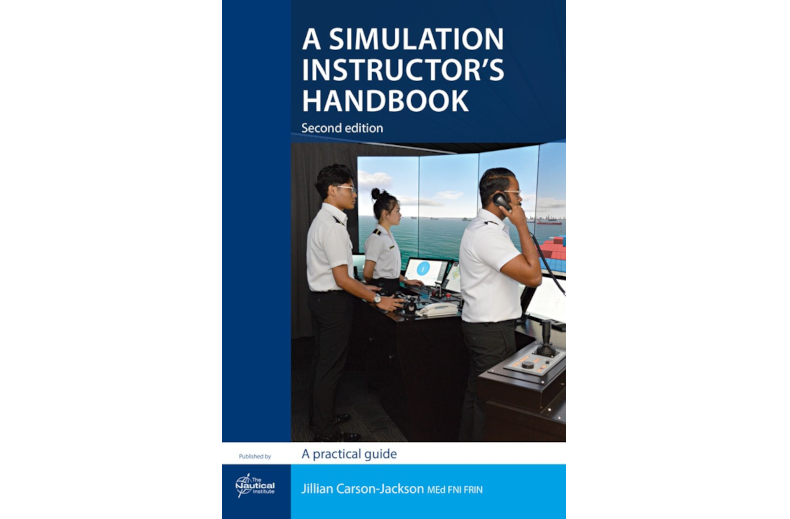A Simulation Instructor's Handbook: A Practical Guide - 2nd Edition
Price for non-members: £69.00
Price for members: £48.30
Code: 0414
ISBN: 978 1 915488 43 5
Release year: 2024
Weight: 250 grams
Page numbers: 100
This updated and expanded handbook, complementary to IMO model course 6.10, is aimed at anyone involved in using simulators in an adult learning environment. It looks at the theory behind adult learning and the use of simulators in training programmes, guiding instructors through setting up, running and evaluating a successful simulation exercise. The handbook’s concise language, illustrative diagrams and helpful checklists make it a must-have publication for any simulation instructor.
About A Simulation Instructor's Handbook - 2nd Edition
Includes:
- Use of simulators in maritime education and training
- The role of the simulation instructor
- How to plan and run a simulation exercise
- Assessments and evaluation methods
The use of simulators in adult learning continues to grow in scope and popularity. The effective use of simulation with focused learning objectives offers participants the chance to develop their skills and widen their knowledge in situations that replicate reality within a safe environment.
This updated and expanded handbook, complementary to IMO model course 6.10, is aimed at anyone involved in using simulators in an adult learning environment. It looks at the theory behind adult learning and the use of simulators in training programmes, guiding instructors through setting up, running and evaluating a successful simulation exercise. The handbook’s concise language, illustrative diagrams and helpful checklists make it a must-have publication for any simulation instructor.
Deciding training needs
Setting up the simulation exercise
Participants on the scene
Assessment and evaluation
References and answers
Jillian Carson-Jackson MEd FNI FRIN has been involved in the maritime industry all her working life. Born in Oakville, Ontario, she joined the Canadian Coast Guard straight from high school, graduating as a navigation officer.
Her experience afloat included ice-breaking, search and rescue and buoy-tending. After coming ashore, she worked in the rescue co-ordination centre (RCC) Halifax, the vessel traffic services centre Halifax and Saint John, New Brunswick. Ten years teaching at the Canadian Coast Guard College (CCGC) followed, covering vessel traffic services, maritime communications and simulators. This included a bridge simulator; a BRM simulation; a VTS simulator; maritime radio communications (shore station radio) and global maritime distress and safety system (GMDSS).
She worked with IALA in the development of VTS training and assisted in the design of the CCGC VTS simulator. She ran ‘train the trainer’ courses at the CCGC for Canadian and foreign students and provided lectures for Norcontrol simulator user conferences.
In 2002, Jillian moved from Canada to France to work with IALA as the Technical Coordination Manager. In 2006, she moved to Australia, where she took on the role of Manager of Vessel Traffic and Pilotage Services. These positions took her away from her passion of training and education, and in 2016 she became Managing Director and CEO of JCJ Consulting. She currently teaches both maritime and corporate training courses and is very happy to be back teaching in the simulator – including implementing on-line interactive simulation training.
Jillian is a Past President of The Nautical Institute, a Director of GlobalMET, a Trustee of ISWAN and is on the Board of Directors of Captains Without Borders. She holds a Diploma of Nautical Science (Navigation) from the Canadian Coast Guard College, a Bachelor of Education (adult education) from the Université de Moncton and a Master of Education from the University of Toronto (Ontario Institute for Secondary Education). She also has a Certificate 4 in Training and Assessment under the Australian Qualifications Framework.
More Information
As simulation technology evolves with virtual reality, augmented reality, and cloud-based applications, new opportunities and challenges emerge for educators and trainees alike. Join us for a compelling webinar exploring the future of simulation in maritime education and training. The webinar brings together the author of A Simulation Instructor’s Handbook: A practical guide and a panel of experts to discuss the integration of these innovative technologies into operational training, the role of simulation instructors, and the future of maritime simulation.
Featured Speakers:
- Jillian Carson-Jackson FNI – Past President of The Nautical Institute and author of A Simulation Instructor’s Handbook, A Practical Guide
- Captain Anthony Patterson AFNI – Managing Director of Virtual Marine Training and Chair of the International Marine Simulator Forum
- Sander Klaasse – Master Mariner and Product Sales Manager at Wärtsilä Voyage, Europe
- Captain Aly Elsayed AFNI – Former Maritime Simulation Projects Lead and Senior Technical Advisor, The Nautical Institute
- Moderator: Prof. Malek Pourzanjani FNI – Head of Naval Education at MLA College and IMO Lead for the STCW Comprehensive Review, The Nautical Institute
Discussion Topics:
The effectiveness of simulators versus real-life sea experience. Essential skills for simulation instructors and their role in enhancing training. The impact of simulator based training and proposed revisions to the STCW Convention The potential for full mission simulation to reduce sea time requirements for certification. Emerging technologies in simulation and their impact on seafarer training and continuing professional development (CPD). This webinar also marks the launch of the fully revised second edition of A Simulation Instructor’s Handbook: A practical guide offering updated insights and tools for simulator based training. The Nautical Institute is a non-governmental organisation (NGO) with consultative status at the International Maritime Organization (IMO). Our aim is to promote professionalism, best practice and safety throughout the maritime industry and to represent the interests of our members.

